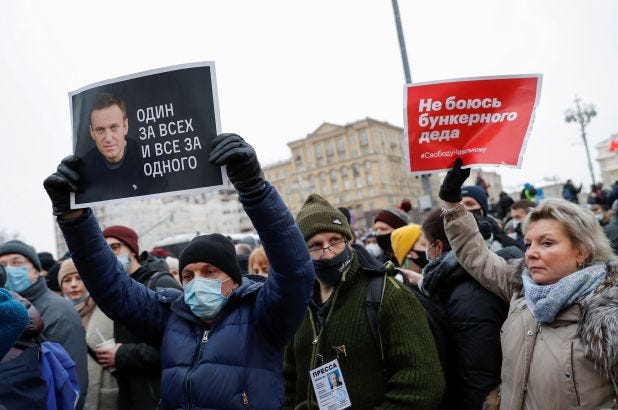
5,100 protestors have been arrested during demonstrations supporting Russian opposition leader Alexei Navalny. Photo courtesy of the New York Post.
No matter the ruling regime, Russia has remained an unfree and undemocratic nation throughout its history. This was true after the Bolshevik victory in the Russian Civil War and Revolution, as well as after the fall of the Soviet Union. However, it would be a mistake to assume that Russia has never undergone liberal reforms. Notable reforms include the
1861 abolition of serfdom
under Tsar Alexander II, “the moderate” (compared to the centralized economic terror enacted by Joseph Stalin),
New Economic Policy of the 1920s
promoted by Nikolai Bukharin and the
glasnost and perestroika reforms
of Mikhail Gorbachev.
While Secretary Gorbachev’s reforms and the fall of the Soviet Union in 1991 undoubtedly led to positive democratic gains in Russia (such as
competitive elections and pluralism in the media
), Vladimir Putin’s election to the presidency has had damaging effects on these reforms. Putin
nationalized the oil producer TNK-BP
in 2012 and placed the
media under the control of the state and Kremlin-friendly oligarchs
when he first came into power. Despite these authoritarian controls on both the economy and political media, opposition to Putin still remains.
Alexei Navalny is considered the
de-facto head of Russia’s anti-Kremlin opposition
and is a staunch anti-corruption and anti-Putin activist. He was arrested in 2014 for embezzlement charges,
which were determined to be politically motivated by the European Court of Human Rights
. Mr. Navalny escaped to Germany on Aug. 20 of last year
to recover from a poison attack
that German scientists determined to be
Novichok
, a Soviet-era nerve agent. Mr. Navalny was arrested immediately after returning to Russia on Jan. 17 and was charged again, this time with
defaming a World War II veteran
. Mr. Navalny vehemently denies this charge.
Mr. Navalny’s arrest has led to mass protests across the country in support of the opposition leader. These protests have been met with heavy opposition from Russian authorities, with over
5,100 protestor
arrests. However, the protestors have remained strong and participated in one of the
largest demonstrations of discontentment against the Putin regime
since he came to power.
Although the opposition to these protests from the Kremlin has been intense, foreign powers such as the United States (U.S.) and the European Union (E.U.) have stood firmly in support of Navalny. The U.S. joined with the E.U. in
sanctioning Russian officials and entities connected with the poisoning
. These actions by the Biden administration show an encouraging effort to promote democracy abroad and hold despotic regimes accountable for their human rights abuses. It is also encouraging that the U.S. convinced the E.U. to levy these sanctions, despite its most powerful member, Germany, who is currently working on the Nord Stream 2 pipeline, which would transport over
55 billion cubic meters of gas
from Russia to Germany.
There may seem to be little hope for Navalny supporters due to the draconian anti-democratic measures undertaken by Putin’s regime, but their resiliency in the face of government authority should give lovers of democracy optimism for the future. Although the amount of democracies has
decreased in the last 15 years
, appreciation for democratic practices and freedom has not diminished. As foreign affairs columnist Jackson Diehl stated in a
Washington Post
opinion
piece
, “69 percent of respondents in Latin American countries, 89 percent in East Asia, 72 percent in Africa and 81 percent of Middle Eastern Arabs agreed with some version of the Winston Churchill-inspired precept that democracy might have its problems, but it’s still the best form of government.”
Dictators may continue to cling to power through the centralization of political and economic power. However, if democratic nations such as the U.S stand united with freedom-loving people in authoritarian nations, there is hope for a more democratic and individual rights respecting future.